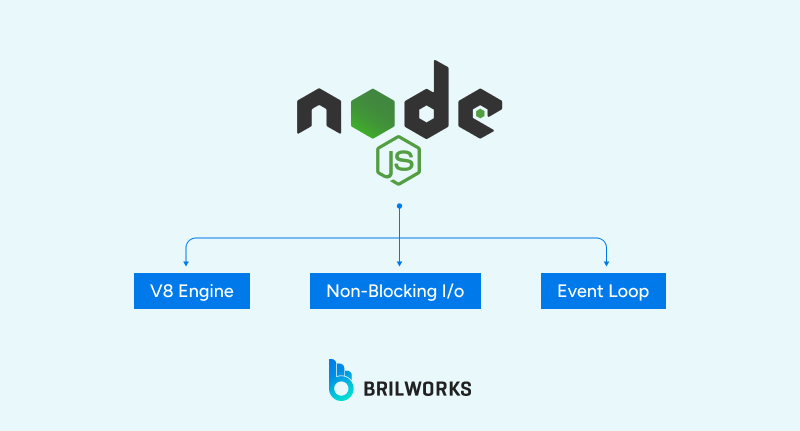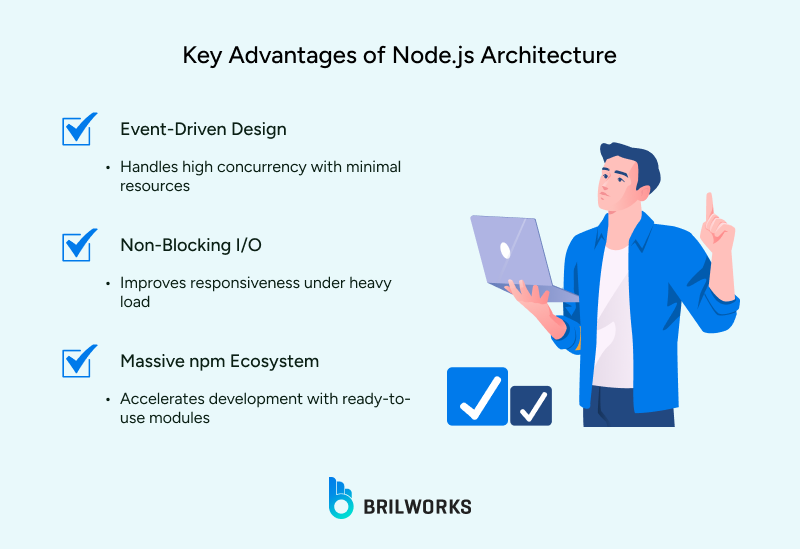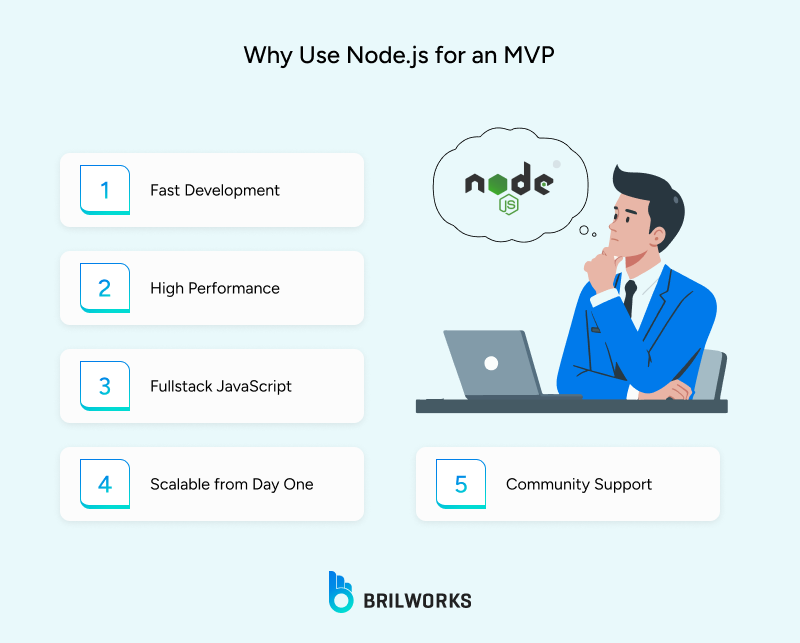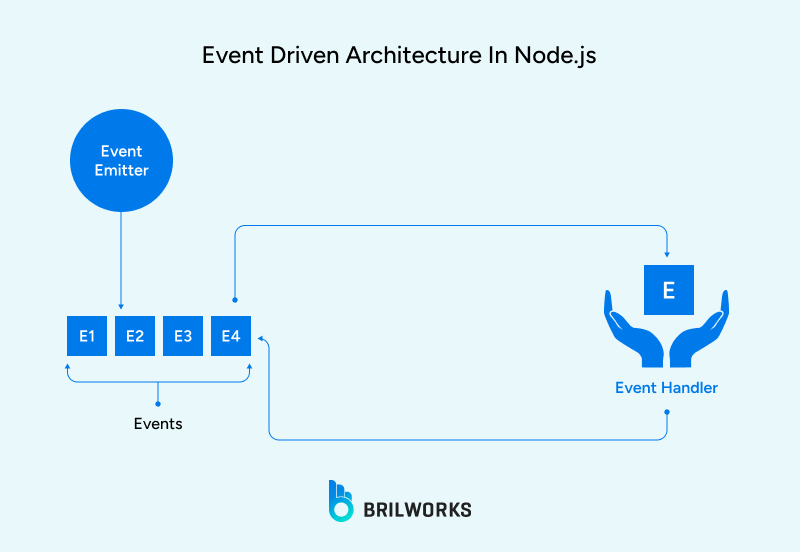COOPERATION MODEL
ARTIFICIAL INTELLIGENCE
PRODUCT ENGINEERING
DevOps & Cloud
LOW-CODE/NO-CODE DEVELOPMENT
INDUSTRY
FRONTEND DEVELOPMENT
CLOUD DEVELOPMENT
MOBILE APP DEVELOPMENT
LOW CODE/ NO CODE DEVELOPMENT
EMERGING TECHNOLOGIES








Picking the right technology stack is one of the first big choices a startup faces. When speed, budget, and flexibility are important, Node.js stands out for founders and product teams.
It helps young companies build and scale easily, and launch features without spending too much on complicated backend systems. Many successful startups have used Node.js to get their products out fast and make changes quickly. Its speed, lightweight design, and use of JavaScript for both front and back end fit well with the way startups operate.
Node.js is not a framework; it's a JavaScript runtime environment. It lets JavaScript run on the server, using Google’s V8 engine to turn code into fast machine language. This setup makes Node.js good at handling many requests at once without slowing down, which is great for startups with limited resources.
Since its launch in 2009, Node.js has become popular because it moved away from the old blocking I/O model, making backend development faster and easier for frontend developers.
By 2025, more than six million web apps have been built with Node.js, with many early-stage startups and small teams choosing it for its speed and flexibility.

Node.js works well for startups because it makes backend development simpler, pairs easily with modern frontend tools. Founders also like that they can hire fewer specialists and create teams that handle both frontend and backend work. Big companies like Netflix, Uber, and PayPal started using Node.js early for these reasons.

For a startup, speed often means survival. Investors expect quick launches, users expect rapid updates, and competitors are always moving. Node.js naturally fits this fast pace.
Instead of dealing with language handoffs or slow deployments, teams can ship products faster and fix issues without major delays. That’s why many founders pick Node.js as the foundation for their MVP.
Getting an MVP out fast lets startups test ideas before investing too much. Node.js helps speed this up in a few ways. Teams can use JavaScript for both frontend and backend. Many early features can be built with npm packages like Express.js for routing, Socket.io for real-time chat, and Passport for authentication.
A good example is how chat-based platforms or early SaaS dashboards can be prototyped in just days using Node.js. Because the learning curve is gentle for frontend developers.

Fast iteration is often more valuable than a perfect first launch. Node.js supports this philosophy well. Its development environment allows hot reloading and rapid testing cycles. Node.js also fits well with automated deployment and testing tools.

Startups succeed when they can learn quickly from their users. Node.js helps by making it easy to build real-time features like live analytics, dashboards, push notifications, and instant feedback forms. Many monitoring and analytics tools have SDKs for Node.js, so it’s easy to add feedback features early on.
A major advantage of Node.js for startups is using JavaScript everywhere. When both frontend and backend use JavaScript, teams can share code and avoid complicated handoffs. For small teams, this efficiency adds up over time.
|
Aspect |
Traditional Stack |
Node.js Stack |
|
Languages Required |
JavaScript + backend language (PHP, Python, Ruby, etc.) |
Single language: JavaScript |
|
Team Structure |
Separate front and backend teams |
Smaller, more flexible full-stack teams |
|
Knowledge Transfer |
Harder to onboard new devs |
Easier and faster onboarding |
|
Development Speed |
Slower due to handoffs |
Faster with unified language |
Using one language helps startups build small, flexible teams. Instead of having separate backend and frontend groups, they can work with a few full-stack developers. This makes hiring simpler, and lowers costs
When both sides of the product use JavaScript, parts of the code can be shared. Input validation, data models, and utility functions can be written once and used everywhere.
This saves development time and also reduces bugs caused by inconsistencies between frontend and backend logic. Isomorphic JavaScript applications push this idea further, allowing parts of the application to run on either side depending on what’s most efficient.
Startups benefit from this kind of efficiency because they can spend more time on core features and less on maintenance.
Launching fast is only half the battle. If a product succeeds, it must scale. Node.js has proven itself reliable in this area, especially for real-time and high-concurrency scenarios.
Its lightweight nature makes it easy to handle large numbers of simultaneous users without needing a lot of infrastructure. Because it uses a single-threaded, event-driven architecture, Node.js can manage thousands of connections with less resource consumption than traditional threaded models.
Node.js supports clustering, so apps can use all the cores on a server. It also works well with tools for containers and orchestration. This makes it easy for startups to grow their infrastructure as their product becomes more popular.
Scalability advantages of Node.js include:
Lightweight runtime with efficient memory use
Event-driven model suitable for high concurrency
Cluster module for horizontal scaling
Easy integration with microservices architecture
Node.js uses an event loop to process incoming requests, which avoids the overhead of spinning up new threads for each connection. This allows applications to handle thousands of requests with consistent performance.
Traditional multi-threaded models can hit resource limits quickly, especially under unpredictable traffic spikes. For startups, this matters because user traffic can grow suddenly, sometimes overnight. Node.js provides a way to manage that growth without major architectural changes early on.

Startups need flexibility in how they scale. With Node.js, vertical scaling (upgrading a single machine) and horizontal scaling (adding more machines or processes) are both supported.
Tools like PM2 and Kubernetes make it easier to deploy multiple Node instances, balance traffic, and maintain performance. If a startup begins with a small server and later needs to handle a global user base, the transition is smoother than with many traditional stacks. This makes Node.js future-proof for fast-growing teams.
For startups, every dollar counts. Node.js helps save money not just by being fast, but also by making teams smaller and hiring easier. Using one language for everything means you need fewer people, and hiring JavaScript developers is usually less expensive than hiring for more specialized tech.
The npm ecosystem also helps cut costs. With over a million open-source packages, developers can find ready-made tools for things like authentication, file storage, or payments. This means less time spent on repetitive code and more time focused on what makes your product stand out.
Finding specialized backend developers can be expensive, especially for early-stage startups. But JavaScript is one of the most widely known languages in the world, which means the talent pool is larger.
Many frontend developers can learn Node.js quickly, which lowers both hiring time and cost. Instead of maintaining two separate teams, a startup can work with a single full-stack team to build and maintain the product.
The npm registry gives startups access to free, battle-tested packages. Instead of building everything from scratch, developers can use these modules to add features quickly. This doesn’t just save time, it saves money. With fewer resources spent on infrastructure or boilerplate development, startups can focus on growth.
Today’s users want instant updates, whether they’re chatting, trading, or working together online. Node.js was designed for real-time use. Its event-driven setup and WebSocket support make it easy to deliver live features without needing lots of extra infrastructure. Many top real-time tools, like Socket.io, are built for Node.js.
Node.js is great for real-time chat apps, collaboration tools, and notifications because it can handle many connections at once with low delay. Startups building SaaS, productivity, or messaging tools often choose Node.js for this reason. They can offer fast, responsive experiences without needing complicated infrastructure from the start.
Many apps today need live streaming, like dashboards, analytics, stock tickers, or IoT devices sending real-time data. Node.js has built-in streaming features that make it a good choice.
It can process data as it comes in, so apps stay responsive. This is especially useful for startups that want to stand out with a great user experience.
A strong developer community is often a good indicator of a technology’s long-term health. Node.js benefits from a large, active, and helpful community. Startups can find tutorials, documentation, ready-made solutions, and active forums where developers share fixes and best practices. Regular updates from the Node.js Foundation also ensure security and performance improvements are ongoing.
This community gives small teams the stability they need. Startups don’t have to solve every problem alone—they can use proven tools and patterns.
Community advantages include:
Frequent security and performance updates
Extensive documentation and learning resources
Strong enterprise adoption ensuring long-term viability
Active support channels through GitHub, forums, and developer groups
Node.js fits well with modern software designs. Startups often like microservices because they let teams build and scale different parts of a product separately. With Node.js, it’s easy to set up lightweight microservices.
Each service can run on its own, be updated without downtime, and scale as needed. This gives startups the flexibility to grow their product step by step.
Breaking the application into smaller independent services allows different developers or teams to focus on specific functions without interfering with each other.
A team could work on payments, another on user management, and another on notifications. This separation aligns with how startups grow—adding features as they need them without having to rebuild the entire system.
Microservices built with Node.js are easier to manage because they’re small, modular, and separate. Teams can update one service without impacting the rest, which lowers the risk during deployments. This step-by-step approach helps startups move quickly, even as their codebase gets bigger.
Node.js has a lot of strengths, but it’s not perfect. Startups should know about some common challenges and how to handle them. For example, CPU-heavy tasks aren’t Node’s best area, so it’s better to use worker threads, separate services, or other languages for those.
Callback hell used to be a problem, but async/await and promises have mostly solved it. Using the right versions and sticking to LTS releases also helps keep things stable.
Common challenges and solutions:
CPU-intensive work: Use worker threads or microservices.
Callback complexity: Adopt async/await patterns.
API stability: Use semantic versioning and automated tests.
Memory leaks: Monitor applications and use mature libraries.
See Also: Bringing AI into Your Node.js Projects? What You Need to Know
Choosing the right technology is just the first step. Many startups succeed because they pair the right tech stack with experienced development partners who understand how to move fast and stay lean. A good Node.js development partner can help with architecture, rapid prototyping, scaling strategies, and long-term code quality.
Node.js isn’t perfect for every project, but for most modern web and SaaS products, it offers a great mix of speed, cost savings, and flexibility. For startups, finding that balance can be the difference between leading the market or falling behind.
Node.js integrates seamlessly with AWS and other cloud providers using SDKs and serverless options. It allows startups to build cloud-native apps without complex setup.
Node.js isn’t ideal for CPU-bound workloads, but worker threads, clustering, or offloading to microservices can solve this problem effectively.
Node.js typically offers better performance for real-time and I/O-heavy workloads. Python and Ruby can excel in other domains, but Node’s unified stack and speed give it an edge for many startups.
Real-time platforms, fintech apps, SaaS products, and APIs benefit the most, especially when scalability and speed to market are key.
JavaScript is one of the most widely known languages. Finding developers familiar with Node.js is usually easier and more affordable than with more niche technologies.
Get In Touch
Contact us for your software development requirements
Get In Touch
Contact us for your software development requirements